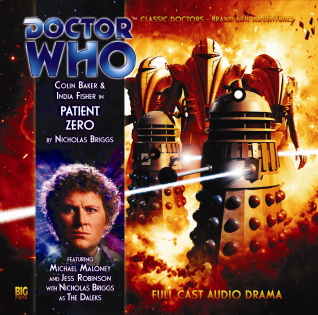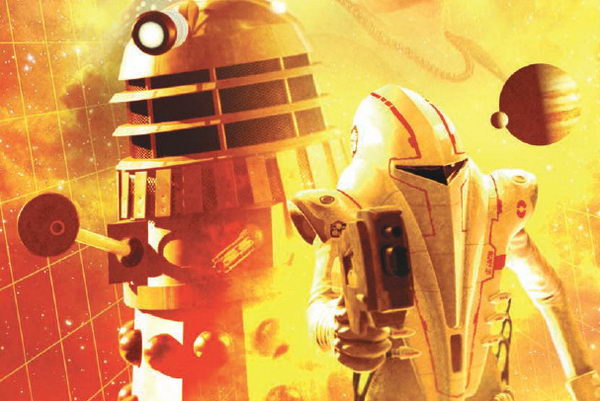|
| |
|
STORY PLACEMENT
THIS STORY TAKES FINISH AUDIO DRAMAS "THE RAINCLOUD MAN" AND "PAPER CUTS."
THE BIG FINISH AUDIO
DRAMAS "I.D." AND EPISODE OF THIS STORY.
PRODUCTION CODE 7C/P/F
WRITTEN BY NICHOLAS BRIGGS
DIRECTED BY NICHOLAS BRIGGS
RECOMMENDED PURCHASE BIG FINISH CD#124 (ISBN 1-84435-412-2) RELEASED IN AUGUST 2009.
BLURB Finally, the Sixth Doctor challenges Charlotte Pollard to tell him the truth. Who is she really? What is she doing in
the
TARDIS? answers, the Doctor must travel back in time, beyond all known civilisations to the vast, mysterious Amethyst Viral Containment Station. But answers lie within the TARDIS too. Someone who has been there a long,
long
time... Daleks have travelled back in time on their own mission, to bring them the ultimate victory they crave. But it is a mission so complex and delicate that even they know they must beware the web
of
time... What has happened to Charley? And why have the legendary Viyrans been summoned? |
|
|
Patient Zero AUGUST 2009 (4 EPISODES)
To say that the release of Patient Zero has been hotly anticipated would be understating things just a little. Last year’s quintet of adventures for the sixth Doctor and his future self’s erstwhile companion, Charlotte Pollard, were the highlight of the Big Finish year for many and their cliffhanger ending left most listeners – myself included – chomping at the bit.
“I don’t believe you. So... Where do we go from here, Charley? Who are you and what are you doing here?”
And as if this weren’t enough to whet listeners’ appetites, Patient Zero promised the long-awaited homecoming of the legendary Viyrans, whose ominous presence underscored most of the 2007 Virus Strand of stand-alone episodes, including their only appearance to date in Mission of the Viyrans. And, just because the opportunity was “just too tempting to miss”, writer Nicholas Briggs also deigned to throw his beloved Daleks into the mix.
Given this story’s alluring list of ingredients, I wasn’t surprised to hear its praises being sung prior to release by the likes of India Fisher, Colin Baker (who cited the script as being his favourite to date) and even Nicholas Briggs himself (who, modesty in retreat, listed the story amongst his top six sixth Doctor audios in July’s edition of Big Finish’s in-house publication, Vortex). This worried me a little bit as I often find that the most-hyped stories are those that disappoint me the most; not usually because they’re below par by any stretch, but because they have an unrealistic conception to live up to. Happily though, when I eventually came to listen to Patient Zero I found that its three-pronged attack delivered on all counts.
Firstly, Briggs masterfully extricates Charley from The Raincloud Man’s cliffhanging climax, giving the Edwardian Adventuress a stay of execution for the time being at least by having her contract a virus and promptly slump into a coma. It seems that the TARDIS shared the Doctor’s fears about Charley, and so when she was revealed to be a fraud, it immediately withdrew the protection that it normally affords its occupants – protection that includes keeping any resident viruses at bay, evidently.
A very neat way of side-stepping the inevitable confrontation in itself, this development ser-ves as a delectable lead-in to the main events of the story, as the increasingly desperate Doctor takes the TARDIS back into the distant past to seek a cure on board the Amethyst Viral Containment Station in a far-flung galaxy, whilst Charley convalesces in the TARDIS’ Zero Room. It also begins to tie the so-called ‘Virus Strands’ together, as we learn that the Doctor made several side trips in the years between this story’s opening scene and the start of the story proper, finally giving one-off stories like Urgent Calls some much-needed context.
“We are the Viyrans. We have our mission. We obey no-one. We are the ultimate authority.”
Of more immediate relevance to Patient Zero though is the abovementioned Mission of the Viyrans, recently re-released by Big Finish as a 99p download to ensure that just about everyone can afford to enjoy the captivating lead-in to this story. That’s not say that Patient Zero can’t be enjoyed in isolation because it can; in fact, many of its twists and turns would no doubt be all the more shocking if the listener wasn’t au fait with Peri’s misadventure on Gralista Social, as depicted in Mission of the Viyrans.
In any event, Patient Zero essentially provides the listener with the same exposition, albeit in much more effusive and dramatic fashion. The first three episodes have a luscious sense of intrigue about them as Briggs’ script squeezes every ounce of mystery mileage out of the enigmatic creations that he first dreamt up as a schoolboy. As soon as we are introduced to the Viral Containment Station’s caretaker, Fratalin, the first seeds of suspense are sown. Nobody has ever seen a Viyran, but they’re on their way; coming to take the station’s stock of deadly viruses and bio-weapons and destroy them in the heart of the Amethyusa star. Michael Maloney does a tremendous job of cranking up the tension in his performance as the hesitant Fratalin (and his eight-hundred ‘familiars’). The legion creature’s dedication to the Viyrans’ “great work” is patent, but so are his nagging doubts. And his fears.
The real protagonists of Patient Zero though are the Daleks, who have travelled back in time on their own mission to recover the eponymous patient zero, Mila – a subject of the Daleks’ viral experimentation that has escaped their clutches and that they have traced to these space-time coordinates.
“There are spatio-temporal imperatives that we must obey.”
What I find so interesting about how the Daleks are portrayed here is that they are, for want of a better word, tempered. And by that I don’t mean that their gun sticks are inoperative in a very obvious Death to the Daleks sort of way; more that they find themselves constrained by the web of time itself and their concern about disrupting it. This leads to some mesmerising scenes between the Doctor and his oldest foes, particularly in the cataclysmic final episode.
“I am the Dalek Time Controller. My function is linked to the flow of the time and space. I control all strategies in the vortex.”
However the Daleks’ temporal prudence, whilst laudable, does smack of being somewhat out of character. This is buoyed to a certain extent by Briggs’ inclusion of a weasely Dalek ‘Time Controller’, who appears to be holding the Dalek Time Squad’s reigns throughout, but even so the listener is required to take a fairly sizeable leap. That said, one could argue that as these Daleks are from relatively late on in Dalek history (post-Terror Firma, at the very least), then it stands to reason that their temporal awareness would increase in tandem with their technology.
The Daleks’ plan here is characteristically Machiavellian though, not to mention ambitious. The reason that they are so keen to retrieve Mila is that the “7001” virus they infected her with is the same one that Peri contracted on Gralista Social, and is the same one that Charley has now. This virus essentially copies the carrier’s DNA and transfers it like a plague to anyone nearby, and the Daleks plan to use it to convert all life forms into Dalek mutants.
The trouble is, Mila doesn’t want to be retrieved. Having lost her memories (and by the sound of things, her mind) whilst in the Daleks’ power, Mila’s first instinct once free was to seek out the Daleks’ mortal enemy (that she had heard so much about, naturally) and stow herself away in his TARDIS, where she would wait for the opportunity to infect one of his many travelling companions with “7001” and then usurp their place. And it took hundreds of years and five of the Doctor’s regenerations, but eventually Mila’s opportunity presented itself and she took it.
“Charlotte Pollard I love you…”
Perhaps the greatest compliment that I can to pay to Mila, and to Jess Robinson who plays her so very unsettlingly, is that I find I her far more frightening than any Dalek or Viyran. There is something utterly disquieting about someone slowly stealing your identity, and though it is admittedly something of a genre cliché I can’t think of an instance of it being executed as thoughtfully and indeed as excruciatingly as it is here. More than that though, Mila herself is utterly chilling; an outright bunny boiler, really taken to the nth degree. If you think you’ve had a bad experience with, say, an ex-girlfriend or an otherwise unwanted admirer, try having one lurking about inside your time machine for six hundred years trying to give your friends a virus that will make them invisible and let her take on their form!
“I can’t be that strong. If that’s strength it is beyond me.”
And it is easy to see why Baker spoke so highly of this script. Not only is it multi-faceted and, as you’ve probably gathered by now, unconscionably complex, but it really brings out the very best in the sixth Doctor; the passion and the gusto that Baker puts into this perform-ance is off the page. I think that it speaks volumes about the type of man that old sixy has become that he would go to such lengths to find a cure for someone who has blatantly mis-led him because, all else aside, he cares about her. And for her part, India Fisher plays another blinder here, not just as Charley, but as her doppelganger in the latter episodes. I really can’t wait to hear what they do with her as her double duties continue through into Paper Cuts.
And on a final note, I really have to say just have damned good Howard Carter’s sound design is. I understand that Briggs is reluctant to delegate such things on his own stories, but the decision to do so has certainly paid dividends here. Not only is Carter’s score suitably chilling, but every single sound - from the noise made by the Day of the Daleks transmat beams to the ‘new series whirr’ as the Daleks glide about – is perfectly redolent.
“This is your purpose in the timeline, Doctor.”
At the end of the day, Patient Zero has proved to be well worth the nine-month wait, and though I don’t agree with those who consider it a superlative piece of work, it is certainly superb. The titanic clash between the Daleks and the apparently indestructible Viyrans is really something to be heard, and with Daleks ransacking the TARDIS (and blowing up the console!) and the colossal ‘wibbly-wobbly, timey-wimey’ ramifications of the Doctor’s mis-calculation in the final episode, there is not a moments reprieve here for the listener. The obvious word that I’ve been trying to avoid using whilst writing this review is ‘blockbuster’,
but it’s the only one that seems to sum up this gargantuan audio drama
suitably succinctly. And given that this must have been a relatively
low-budget production with just a small ensemble cast, that has to be
considered something of triumph in itself.
|
|
|
Copyright © E.G. Wolverson 2009
E.G. Wolverson has asserted his right under the Copyright, Designs and Patents Act, 1988 to be identified as the author of this work. |
|
|
Unless otherwise stated, all images on this site are copyrighted to the BBC and are used solely for promotional purposes. ‘Doctor Who’ is copyright © by the BBC. No copyright infringement is intended. |
|

.jpg)




